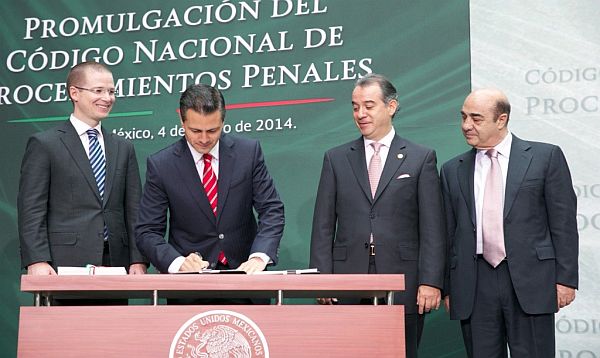Mexico City, Mexico - For the first time in over 200 years, Mexico has a unified national criminal procedure code covering each of its 32 states as well as the federal government.
Since Mexico’s independence, there have been separate penal codes for each state. The new national code, the Código Nacional de Procedimientos Penales, will streamline the entire judicial system and obligate each state to adhere to the same principles of justice.
Originally proposed during the Felipe Calderón administration, the new penal code was signed into law last week by President Enrique Peña Nieto during a ceremony at the National Palace in Mexico City.
"Up until now, there were 33 different penal codes in the nation, and each one had a different way of carrying out judicial proceedings," Peña Nieto said during the ceremony. "Now there will be only one code which will be valid throughout the nation."
 |
"This will be the first penal code to be produced from the consensus and agreement of national political forces represented by congress," said the President. "It will strengthen the institutions’ capacities and tools to investigate, process, and punish criminal conduct on the state and federal levels. It will also allow Mexicans to enjoy the constitutional right of a fair and speedy trial."
Peña Nieto went on to say that the new penal code will also facilitate citizen complaints — which he described as invaluable to putting an end to impunity — and speed up the implementation of the new judicial system in which the accuser will have to provide evidence before charges are brought against the accused.
The new laws, which will be phased in from now through June 2016, will ensure that a criminal trial conducted in one state typifies a criminal trial conducted elsewhere in the republic. Mexico's last major revision of its federal criminal code was in 1934.
The new uniform code of criminal procedure is an appendage of the 2008 constitutional amendments requiring the nationwide implementation of "oral trials" - a process which is still underway. An oral trial is one where witnesses to a crime must appear in open court and testify under oath, subject to direct and cross examination by a public prosecutor and defense attorney. They are intended to function as criminal proceedings do in the US, although in Mexico there are no juries.
Under the new laws, there will be minimum requirements for the investigation of offenses, together with forensic procedures which emphasize the protection and careful processing of a crime scene. And, in a country where the line of legal distinction between judges and prosecutors is frequently a bit obscure, the new code will define the unique roles to be played by these groups as well as by the defense attorneys in a criminal trial.
President Peña Nieto also presented his Alternate Conflict Solution Law initiative, which he said looks to resolve a large number of cases by means of alternative justice, focusing on restorative instead of punitive solutions to crimes, allowing the justice institutions concentrate their resources and capacities on the investigation and detention of the most dangerous criminals.
Each of Mexico's 32 provinces must publish the uniform code in its official state register within the next 270 days, and begin implementing it.
Source: The News



